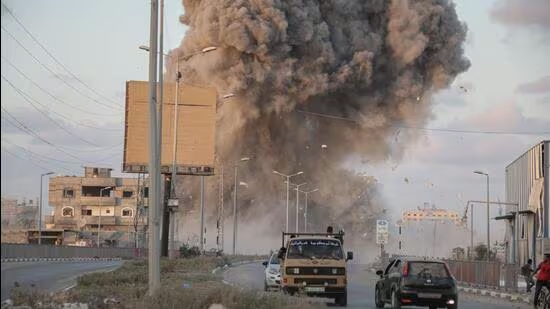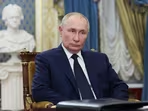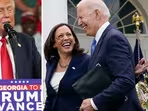Exclusive | US alone won’t broker peace, regional parties must step up: Ex-Egypt Foreign Minister Fahmy on Israel-Hamas truce deal
New Delhi: In the backdrop of high-level peace talks between Israel and Hamas in Cairo, the host nation’s former foreign minister Nabil Fahmy speaks to HT about the prospects of a truce and the challenges for lasting peace in the region.


Edited excerpts from the interview:
Q. How does Egypt address concerns that its role in the negotiations is influenced more by its domestic security and counterterrorism priorities than by regional stability or humanitarian considerations?
“We’ve been navigating geopolitical issues for 7,000 years and balancing domestic and regional priorities. While the public can be emotional, their concerns often align with national interests. The ongoing discussions are about implementing a UN Security Council resolution adopted back in May, based on US President Joe Biden’s proposals. This resolution aims for a ceasefire and a two-state solution between Palestine and Israel, ensuring the connection between Gaza and the West Bank remains intact.
“While Hamas has expressed agreement with the proposals since May, they’ve opposed additional Israeli demands, whether related to the Philadelphia corridor or the actual percentage and number of incarcerated people to be released. Meanwhile, Israel has yet to fully agree.”
Q. Egypt has traditionally positioned itself as a key mediator in Middle Eastern conflicts. Given the lack of a breakthrough despite months of negotiations, is Egypt’s mediation strategy failing, or are there external factors that have severely limited Cairo’s influence this time?
“Our strategic goal is peace between Arabs and Israelis, and we aim to build a stable and secure Middle East. This can’t be achieved through military conflict; it requires resolving the underlying political issues. The military is just a tool, not a solution. The real objective is to resolve the conflict between Palestine and Israel, ensuring both have a contiguous and respectable landmass.
“We’ve pursued this relentlessly since the ‘73 war, and while we’ve faced disappointments and challenges, we believe that implementing the Security Council resolution could have been a significant step forward. If we see parties violating or distorting the peace process, it makes us question our efforts. But as long as there’s a chance for progress, we’ll keep pushing. That said, I’m not optimistic. The real issue is the lack of a strategic desire to end the conflict, not the details, which often serve as excuses.”
Q. Do you think the US is playing an effective role in facilitating a truce, or is Washington’s bias towards Israel undermining any real chance for peace? Also, do you think the Middle East conflict could be settled if Trump returns to the White House?
“The US role has been biased and has shielded Israel from accountability for the past 70 years, while providing it with weapons and economic support. This bias also hinders legal accountability processes. However, the US is crucial for concluding agreements, as seen with the Egyptian-Israeli and Jordanian-Israeli peace agreements, and even the Oslo process, where American support was key. The US has immense political weight, in addition to its wealth and military power.
“But I don’t believe the US alone can be an unbiased broker. Regional parties need to genuinely pursue peace, and the international community, including the Security Council and major states like India and Brazil, must be more vocal. The US is needed, but it should be part of a broader international effort.”
Q. What specific mechanisms or assurances is Egypt pushing for to ensure that any truce reached now is durable and not just a temporary pause in hostilities?
“That’s an excellent point, and I appreciate you bringing it up. Apart from the Security Council resolution I mentioned earlier, which incorporates Biden’s proposals for Gaza, one key issue being debated is the reoccupation of Gaza, which we strongly oppose under any circumstances.
“Our concern with Israeli forces remaining in Gaza is that it could legitimise their presence, and we don’t agree with that. There’s a difference between taking security measures and allowing the occupying force to reclaim territory under the guise of security. I believe that true security comes from peace, not the other way around.”
Q. Is Egypt under pressure from the US or regional powers to take a particular stance, and how does it manage such pressures while maintaining its regional leadership?
“Yes, we’re under pressure with both politics and geopolitics at play. While the US and Egypt share the goal of moving forward, the US might have different timelines driven by their politics. Here in the region, we understand that this isn’t about maintaining or establishing a new status quo. The conflict has lasted over 70 years, and every ceasefire without a conclusive peace process only prolongs the occupation—something we won’t agree to.
“Egypt and the US, both want a resolution, but for us, living next to this conflict, it’s crucial to resolve it. Security arrangements can be discussed, but without addressing the root conflict, they won’t bring real security. Peace must be the foundation for any security measures, not the other way around.”
Q. With Hezbollah’s recent strikes on Israel and the potential for a broader regional conflict, how does Egypt assess the risk of spill over into other parts of the Middle East? Does Cairo believe it has sufficient influence to prevent a wider escalation involving Lebanon, Syria, and Iran?
“Let me be very candid with you—no, we can’t do this alone. We don’t have that kind of influence, and even the US, as a superpower, hasn’t been able to solve it. If we could have done it by ourselves, we would have already. The parties involved, both local and regional, haven’t managed to resolve this, and the conflict has been going on for 70 years. It’s not just Palestine and Israel; it extends to Lebanon, the Golan, and even Iran.
“There’s a real danger that this could spiral out of control, whether intentionally or by miscalculation. So yes, we’re concerned and are trying harder and harder. But you’re right—this tension makes it difficult to create options that don’t just lead to a new status quo. We need concrete steps to disengage the parties militarily, but this has to be part of a process that doesn’t legitimise the occupation and ultimately resolves the conflict. Otherwise, 10 years from now, someone else will be answering the same questions.”
Q. Israel insists on maintaining troops along the Philadelphi Corridor to prevent Hamas from rearming. Does Egypt view this as an infringement on its sovereignty, or does Cairo tacitly support this measure as necessary for regional security?
“No, we don’t support this measure at all because we don’t think it’s important. The irony is that we opposed Israel’s occupation of Gaza and advised them in 2005 to coordinate their withdrawal with the Palestinian Authority for a smooth transition. They withdrew, not for peace, but to consolidate their hold on the West Bank.
“Now, they’re arguing to reoccupy land they left, which we believe will only cause instability in the region. It’s not just about border security; it’s about not legitimising reoccupation under the guise of security. There are plenty of ways to ensure security without Israeli forces, especially if tied to a time-sensitive negotiation process that aims for lasting peace.”
Q. The ongoing displacement and civilian suffering have drawn international condemnation. Is Egypt prepared to take a harder stance against Israel in the truce talks or are there specific concessions that Egypt is unwilling to push for?
“We’re under immense pressure because we can’t ignore the ongoing humanitarian crisis in Gaza. While we’re working on a political solution, we know that delays mean more suffering for Palestinian civilians. This dual pressure is significant in our community.
“With at least 40,000 Gazan deaths, including many women and children, it’s hard to justify this as a civilised approach. We don’t condone it and have been trying to provide humanitarian aid. Our continuous efforts for a ceasefire, hostage exchange, and conflict resolution aim to ease the situation, but it’s a major socio-economic and political challenge for us.”
Q. Hamas described the October 7 attack as an ‘act of armed resistance.’ How do you believe this attack, which escalated the Gaza conflict, has benefited ordinary Palestinian civilians?
“I don’t think ordinary Palestinian civilians have benefited from this situation. Over the last 75 years, there have been numerous attacks on Palestinians in the West Bank and Gaza, even while they’re praying in mosques. Violence only breeds more violence, and it’s not just one-sided. Remember, the assassination of Israeli Prime Minister Yitzhak Rabin was carried out by Israeli extremists opposed to his attempt to achieve peace with the Palestinians! The problem isn’t new; it began back in 1948.
“So, instead of focusing on counting deaths on each side, we should work towards a resolution to prevent future loss of life. Supporting one side over the other won’t help; we need to address the underlying issues of occupation and lack of basic well-being. Ending the occupation and ensuring security for all—Arabs and Israelis—is the only way to move towards peace. Security arrangements can help, but they can’t solve the problem on their own.”
Q. Do you think Netanyahu’s goal to completely eliminate Hamas is realistic, or is it just an unattainable ambition?
“I see it as a tactic. Netanyahu doesn’t seem interested in ending the violence. He always finds a new threat, whether from Hamas, Iran, Hezbollah, or the Golan Heights. Interestingly, before October 7, he once said that he supported Hamas to divide the Palestinian factions and weaken their push for a two-state solution. So, for him, maintaining tension is a strategy to avoid accountability, which would become more pressing if the violence were to stop.”
Disclaimer: The copyright of this article belongs to the original author. Reposting this article is solely for the purpose of information dissemination and does not constitute any investment advice. If there is any infringement, please contact us immediately. We will make corrections or deletions as necessary. Thank you.
Title:Exclusive | US alone won’t broker peace, regional parties must step up: Ex-Egypt Foreign Minister Fahmy on Israel-Hamas truce deal
Url:https://www.investsfocus.com







